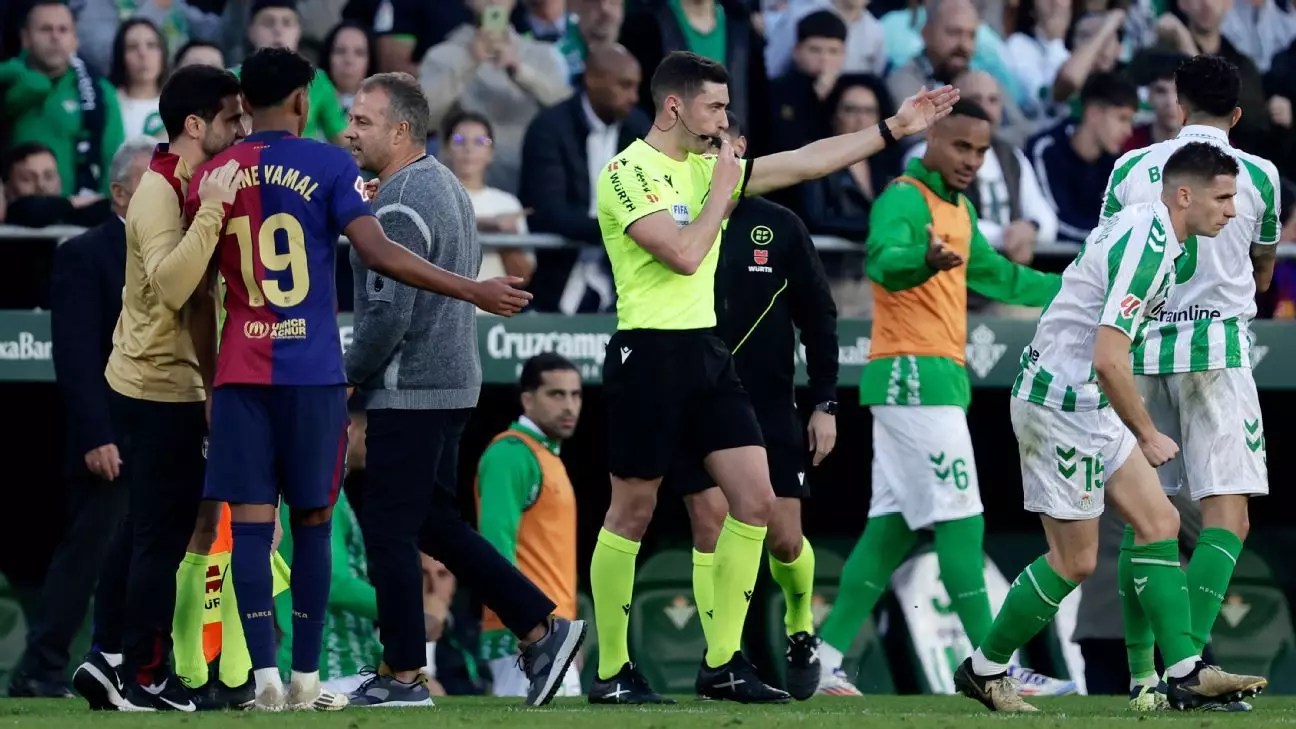Barcelona football club, once a titan of European football, is currently grappling with the consequences of inconsistent performances under the management of Hansi Flick. This past weekend, the team faced Real Betis, where they encountered yet another troubling outcome—a 2-2 draw that exemplified the team’s ongoing challenges in LaLiga. Flick’s post-match reflections revealed a blend of frustration and the acknowledgment of the need for development within the squad.
Struggling for Consistency
The draw against Real Betis marked Barcelona’s fourth time dropping points in their last five league matches. Starting the season with high hopes, they led through goals from Robert Lewandowski and Ferran Torres, but failed to maintain control, leading to a disappointing second half that saw them concede twice. The club’s inability to close out games has noticeably weakened their once-comfortable position at the top of LaLiga, allowing their rivals, particularly Real Madrid, to narrow the gap. A nine-point lead has now shrunk down to just two, which raises serious questions regarding the psychological and tactical edge that Barcelona previously enjoyed.
In his analysis after the match, Flick did not mince words. He admitted that the performance was “really bad,” signifying a stark acknowledgment that improvement is essential. The squad, which is heavily populated by young talent, is still in the process of development. Flick emphasized the significance of showing quality on the field, stating that the team must learn from these experiences to augment their playing style.
In the world of football, substitutions are often a pivotal aspect of gameplay and strategy. Flick’s decisions during the second half generated criticism, particularly when he opted to withdraw key players—Lewandowski and Raphinha—at a crucial stage in the match. His rationale, focusing on a tentative approach towards an impending Champions League fixture away against Borussia Dortmund, has sparked debate over the balance between league commitments and cup competitions. Given that Barcelona had a tangible grasp on the match at that point, the substitutions raised eyebrows.
The German coach justified his tactical choices by stating that the team’s performance had been underwhelming even with their star players on the pitch. However, the dynamics of a live match are complex, and it appears that making significant alterations in such a crucial moment may have inadvertently contributed to the shift in the match’s momentum. The decision to prioritize freshness over form can often backfire, creating a challenge in fostering continuity within the squad’s play.
Compounding Barcelona’s frustrations during the match were contentious moments, particularly regarding the penalty awarded to Real Betis. Flick’s dissatisfaction with the decision was palpable, citing a lengthy VAR review that vexed him to the extent of receiving a red card for his protests. Such emotional reactions from coaches are not uncommon, but they can severely impact team morale and focus, particularly during pivotal fixtures. Flick’s experience in dealing with officiating could provide a lesson in maintaining composure in heated moments despite the high stakes involved.
Flick’s claims that he “said nothing” while being sent off seem to clash with the referee’s report, which duly noted his animated response. Accepting responsibility while adhering to the principles of sportsmanship can often be a delicate balance for high-profile managers. This incident opened a broader dialogue not only about the manager’s role but also about how rules are interpreted consistently in significant matches.
Looking Ahead: A Period of Reflection
The road ahead for Barcelona is sure to be challenging as they strive to reclaim their position as one of Spain’s finest. Flick’s remarks regarding the quality and potential of the team indicate a pathway towards growth, provided the young players can learn from these setbacks. Furthermore, the upcoming matches will be pivotal in determining whether the squad can settle the inconsistencies that have plagued their performance.
Ultimately, for Barcelona fans, the hope lies in the progressive transformation of the squad coupled with tactical strategies that see more effective outcomes. There is an undeniable aura of talent within the team, yet it requires the right leadership, inspiration, and most importantly, a steadfast resolve to rise above adversity. Only time will reveal whether Barcelona can harness their potential to emerge triumphant in both domestic and European contests.


Leave a Reply